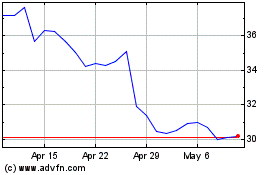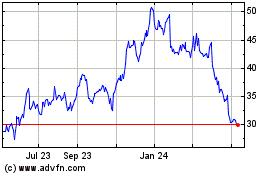By Jay Greene and Tripp Mickle
Intel Corp. Chief Executive Brian Krzanich resigned over
violating company policy for having a consensual relationship with
a co-worker, a sudden turn for the tech giant as it seeks to extend
its dominance in PC chips into new frontiers in computing.
Mr. Krzanich's exit makes him one of the most prominent CEOs to
lose a job in an era of greater scrutiny over workplace
relationships.
His departure comes at a transformative time for Intel, which
under Mr. Krzanich swallowed its two biggest acquisitions as it
tries to expand in new arenas such as artificial intelligence and
advanced automotive technologies. Intel also is fending off threats
to its dominance from rivals such as Nvidia Corp., whose graphics
chips power some of the fastest computers in the world.
Intel said a continuing investigation by internal and external
counsel confirmed a violation of the company's nonfraternization
policy, which applies to all managers. Intel said it accepted Mr.
Krzanich's resignation Wednesday.
Mr. Krzanich couldn't be reached for comment.
The board said Thursday Chief Financial Officer Robert Swan
would become interim CEO, effective immediately. Mr. Swan, who
previously served as eBay Inc.'s CFO, is considered by the board to
be a skilled finance chief who has played a critical role in
improving Intel's profitability since joining in 2016, a person
familiar with the matter said.
Intel, which dealt with the sudden departure of its CEO in 2012
when Paul Otellini announced plans to step down, has begun an
internal and external search for a new leader.
Intel held a companywide video webcast from its Santa Clara
office at 11 a.m. local time, according to a current employee who
viewed the webcast. Executives on stage, who included Chairman Andy
Bryant and Mr. Swan, declined to answer employee questions about
the relationship that led to Mr. Krzanich's resignation, saying
they wanted to protect the privacy of the Krzanich family and the
person involved, according to the employee.
"The general feeling is one of disappointment," the employee
said. Intel goes out of its way "to make sure we understand what
the rules are and that we follow them. To have the leader of the
company violate these rules is disappointing."
Mr. Swan, who was introduced by Mr. Bryant as the interim CEO,
said he wasn't interested in staying on as the permanent chief.
Two current Intel executives -- Venkata M. Renduchintala, known
as Murthy, and Navin Shenoy -- are believed to have the inside
track among internal candidates to succeed Mr. Krzanich, according
to people familiar with the company's leadership.
Dr. Renduchintala, who previously worked at Qualcomm Inc., is
Intel's engineering chief, overseeing development of the company's
traditional processors and coming graphics chips. He recently took
responsibility for manufacturing operations, which have been
plagued with delays in producing the company's next-generation
chips.
Mr. Shenoy currently oversees Intel's high-margin data-center
business, and before that ran its PC business -- Intel's most
dominant businesses -- which both showed improved performance under
his leadership, the people said.
Intel could turn to outside candidates. The company's delays in
producing its next-generation chips could justify hiring an
external executive with expertise to improve its approach to
manufacturing, analysts at UBS said.
Mr. Krzanich's departure comes as companies wrestle with what
constitutes appropriate relationships in the workplace. Intel
prohibits managers from having sexual or romantic relationships
with direct or indirect reports, a spokesman said.
The policy, instituted in 2011, is a "hard ban" that applies to
all managers regardless of seniority level, the spokesman added.
The company said it expects all employees to respect Intel's values
and adhere to its code of conduct, and its policy requires
employees who see or believe someone acted inappropriately to raise
their concerns immediately, he said.
Intel's shares fell 2.3% to $52.23 in afternoon trading in New
York. Along with the CEO news, the chip maker provided a
better-than-expected financial outlook for the current quarter.
Mr. Krzanich received $21.5 million in compensation in 2017,
including stock awards and other incentive pay, up 13% from the
previous year, according to a regulatory filing. Intel noted that
Mr. Krzanich would have been eligible for $38 million had he left
the company last year by voluntary termination or retirement. Intel
didn't immediately say whether Mr. Krzanich would receive that
compensation now.
Mr. Krzanich's sudden exit is the latest high-level departure
for the company.
Diane Bryant, former head of Intel's data-center group, joined
Google's cloud business late last year. Stacy Smith, Intel's
onetime finance chief who later headed up manufacturing, also left
last year after three decades with the company. Kirk Skaugen,
former head of client computing who was at one point seen as a CEO
candidate, left the company in 2016 and is now with Lenovo Group.
Renee James, Intel's former president, left in 2015.
"We fail to see a clear internal long-term successor given
recent changes to senior management," analysts at Cowen & Co.
said in a research note Thursday. "However, given so much change
driven by Mr. Krzanich, his departure could make succession
planning and further transition challenging."
While details of the relationship weren't disclosed Thursday,
the resignation highlights the discussions happening in workplaces
around the country over how employers should regulate office
romances.
Dating policies at U.S. companies vary. Some employers don't
allow senior managers to have relationships with co-workers, even
if they aren't direct reports. The idea is that even if a manager
doesn't directly oversee an employee, they may have more power
within the organization. Other companies have no issue with
consensual relationships but have asked for them to be disclosed.
Still others have no dating policy at all.
Some companies have been revamping their rules around workplace
relationships in the wake of the #MeToo movement. Intel, like many
other technology companies, has said it was working to increase
gender and racial diversity in its workplace. In its 2017 diversity
report, the company said 73.5% of its total workforce was male.
Mr. Krzanich started at Intel in 1982, rising through a series
of technical and leadership roles to become chief executive in
2013. He set about a broad effort to diversify the company's
offerings beyond its stronghold in processor chips for personal
computers, a market in which Intel holds a more than 90% share,
according to Mercury Research, leaving it scant room to grow as PC
shipments decline.
Intel's strength in processing chips has come under pressure as
graphics processors, primarily from Nvidia, emerged as a workhorse
for artificial intelligence. Intel in 2016 sought to address that
market by buying Nervana Systems and Movidius, a pair of startups
working on AI-focused chips. It recently launched an effort to make
graphics chips to better compete with Nvidia.
Intel became more acquisitive under Mr. Krzanich. He built out
Intel's business in data-center servers, supplying companies such
as Amazon.com Inc. and Microsoft Corp. that are spending billions
annually on cloud-computing facilities. A big chunk of that growth
came from Intel's $16.7 billion deal for Altera Corp. in 2015 --
the company's biggest-ever acquisition.
Mr. Krzanich followed up his Altera buy with a big bet on the
booming market for automotive-vehicle technology by spending $15.3
billion for Mobileye NV, a leader in sensors for assisted-driving
features.
Mr. Krzanich also sought growth in others areas, beefing up
Intel's position in outfitting a variety of household and
industrial equipment with computing capabilities, a burgeoning
business known as the Internet of Things. Intel also has made a
push in the market for cellular-communications chips, replacing
Qualcomm Inc. units in a portion of Apple Inc.'s iPhones, and has
made inroads on 5G cellular technology.
Mr. Krzanich also pushed Intel into visibly high-profile areas
such as augmented-reality headsets and competitive gaming known as
esports. Some of these efforts fell short; Intel, for instance,
shut down several products designed for wearable computing, such as
smartwatches.
Since being named CEO, Intel's share price has risen 123%,
outpacing the S&P 500 but underperforming the PHLX
Semiconductor Sector Index. Sales have grown nearly 18% between
2012 and 2018 to $62.76 billion. Last year, Intel held a 99% share
of the most popular type of chips used in servers, and a 91% share
of the processors found in PCs, according to Mercury Research.
--Yoree Koh and Aisha Al-Muslim contributed to this article.
Write to Jay Greene at Jay.Greene@wsj.com and Tripp Mickle at
Tripp.Mickle@wsj.com
(END) Dow Jones Newswires
June 21, 2018 17:22 ET (21:22 GMT)
Copyright (c) 2018 Dow Jones & Company, Inc.
Intel (NASDAQ:INTC)
Historical Stock Chart
From Mar 2024 to Apr 2024

Intel (NASDAQ:INTC)
Historical Stock Chart
From Apr 2023 to Apr 2024
